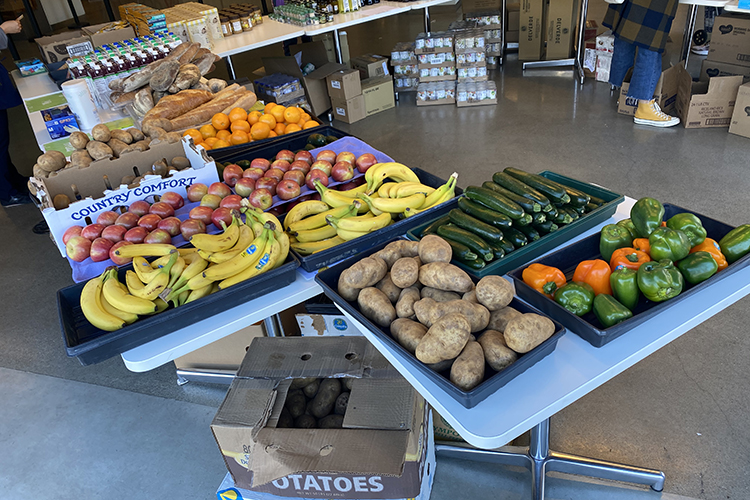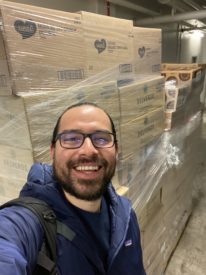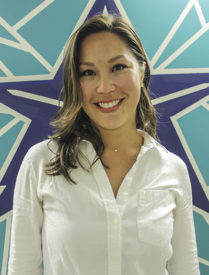UC Berkeley’s Basic Needs Center helps students struggling during shelter-in-place
“You can’t assume that people have shelter, and have food to take care of themselves, when they're sheltering in place,” center leader says
March 20, 2020

UC Berkeley’s Basic Needs Center provided a diverse array of food in its first on-campus “food pop-up,” following the move to remote instruction last week. Due to the shelter-in-place order, the pop-ups can no longer take place on campus, but alternate methods for the pop-up will be created in the coming week. (Photo courtesy of Kiyoko Thomas)
UC Berkeley’s Basic Needs Center has seen a surge in services as statewide shelter-in-place orders have left some students without work and sufficient housing.
For instance, in one day last week, the center received the same amount of housing assistance applications it would usually get in an entire month. The center has also seen a more than 15% uptick in the average use of the campus food pantry, which helps provide basic groceries to students and staff in need.
Nearly 1,000 students have made use of the food pantry, including the center’s on campus food distributions known as “food pop-ups,” in the last two weeks.

Ruben E. Canedo, chair of the Basic Needs Committee at Berkeley, poses with a stockpile of food donated to the Basic Needs Center. (Photo courtesy of Ruben E. Canedo)
To deal with this influx, the center has ramped up its efforts, despite being unable to welcome students to its home in the Martin Luther King Jr. Student Union, which currently is closed in response to the COVID-19 virus. Now, operations are being handled remotely.
“You can’t assume that people have shelter and have food to take care of themselves when they’re sheltering in place,” said Ruben E. Canedo, chair of Berkeley’s Basic Needs Committee. “We didn’t want our students with those limitations to put themselves in a place of danger, to put themselves in a place of harm.”
As a result of pervasive shelter-in-place rules, the center cannot provide in-person support. So, the four-person staff — many of whom are working from home — is helping students with food, housing and financial insecurities through phone and e-mail consultations. The staffers also are distributing food to students.
Many students depending on the basic needs center want to go home to their families, but cannot leave Berkeley because they are unable to break their apartment leases, said Berkeley’s Basic Needs Manager Kiyoko Thomas. Thomas said she and her colleagues are helping students who work on and off campus and have lost wages because their workplaces have closed.
“We are supporting students with a spectrum of emergency needs, including students who are experiencing barriers to accessing food, termination of employment and a loss of wages, as well as disruptions and transitions in their housing,” Thomas said. “But the wage-loss issue is just heartbreaking, because students are going into panic mode. They don’t have the income that they had planned on.”

Kiyoko Thomas is manager of the Basic Needs Center, which is on the lower level of the MLK Jr. Student Union. (UC Berkeley photo by Jeremy Snowden)
Basic Needs Center staff are delivering food from the campus food pantry to student families living at University Village and to disabled students in residence halls. Before the shelter-in-place mandate, food pop-ups on campus were an easy way for students to get essential groceries. Thomas said the pop-ups can be modified to comply with social distancing rules and will return soon for students who are still living in Berkeley.
One of the students who made use of the Basic Needs Center was second-year transfer student Nathalie Guillen, who said the center gave her some much-needed nonperishable food to bring home when she returned to San Francisco to shelter in place with her family.
“The Basic Needs Center is doing an amazing job at helping keep up at least some level of normality as we transition to off-campus instruction,” Guillen said. “They deserve all the love, and a shout out, for trying their best to help us keep some structure and sanity.”
Fabrizio Mejia, Berkeley’s assistant vice chancellor for student equity and success, said the Basic Needs Center’s reaction to COVID-19 regulations has been a model for the other UC campuses, which have taken their cue from Berkeley.
“In a crisis, the need to think about how we deliver basic needs becomes even more critical,” he said.
All Basic Needs Center service updates can be found at the “UC Berkeley Basic Needs Center COVID-19 Living Guide” an online document the center is frequently updating to inform the public on changes to the center’s services.